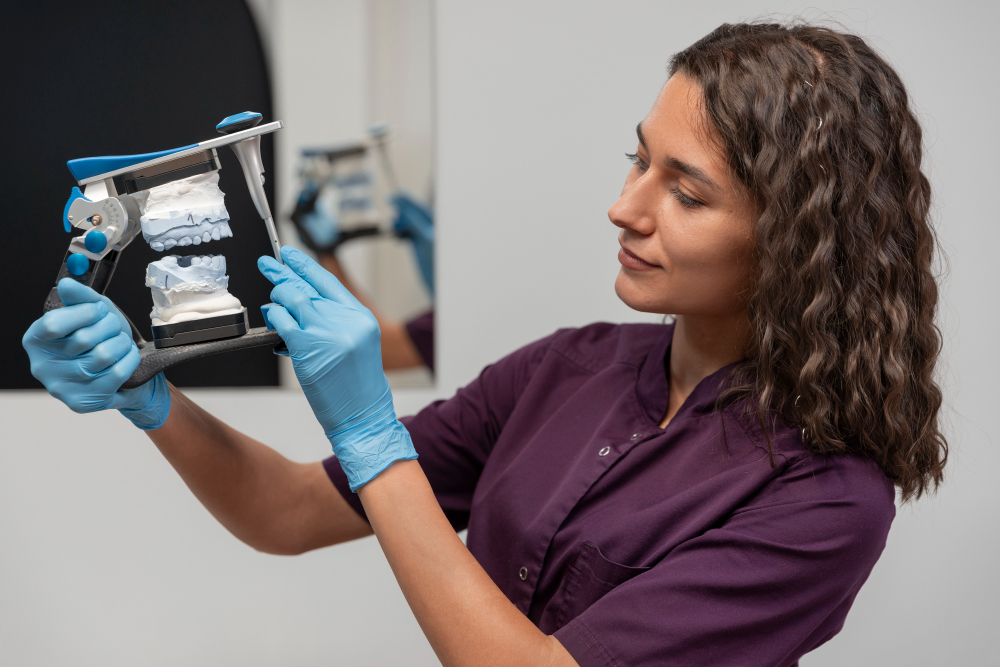Understanding the success rate of dental implants is crucial for any dentist looking to enhance their expertise in implantology. At the International Institute of Implantology and Advanced Aesthetics, we offer specialized courses to help dental professionals advance their skills and stay up-to-date with the latest techniques. The success rate of dental implants typically ranges between 95% and 98%, but this can vary based on a variety of factors. In this post, we’ll explore the key factors that influence implant success, how to prevent failure, and how continuous professional development can help improve outcomes for both you and your patients.
What is the success rate of dental implants?
The success rate of dental implants is one of the most critical factors for dentists to consider when offering this treatment to patients. On average, dental implants have a success rate of about 95-98%, making them one of the most reliable procedures in modern dentistry. However, it’s essential to understand that the exact success rate can vary based on a range of factors, including the patient’s health, the type of implant used, and the experience of the dentist performing the surgery.
Recent advancements in implant technology, such as the use of high-quality titanium and computer-guided surgical techniques, have significantly improved the overall success rate of implants. This highlights the importance of staying current with the latest developments in dental implantology, which is precisely what the courses at the International Institute of Implantology and Advanced Aesthetics are designed to support. By mastering the skills taught in these courses, you can enhance your ability to achieve optimal results for your patients.
Factors that affect the success rate of dental implants
Several key factors influence the success rate of dental implants. Understanding these factors is essential for improving outcomes and ensuring long-term success for your patients. Let’s explore some of the most significant elements:
- Patient health: A patient’s overall health plays a critical role in implant success. Conditions such as diabetes, smoking, and poor oral hygiene can increase the risk of implant failure. Additionally, inadequate bone density or volume can make it challenging for the implant to properly integrate with the jawbone. Before proceeding with the procedure, thorough health assessments and possible pre-surgical treatments, like bone grafting, may be necessary to ensure the best possible outcome.
- Implant type and material: The type of implant used also affects success rates. Titanium implants, known for their durability and ability to integrate with bone, remain the most common. However, ceramic implants are gaining popularity, especially for patients with metal sensitivities. Choosing the right implant material and type, based on each patient’s needs, is essential for optimal success.
- Surgical procedure: The experience and expertise of the dentist performing the implant procedure directly impact the success rate. Advanced surgical techniques, such as computer-assisted implant placement and 3D imaging, can increase precision and reduce the risk of complications. Dentists who invest in ongoing education, like the advanced courses offered by the International Institute of Implantology and Advanced Aesthetics, gain the skills necessary to improve patient outcomes through these cutting-edge methods.
- Post-operative care: Proper post-operative care is just as important as the surgery itself. Following instructions for care, including oral hygiene, avoiding certain foods, and attending follow-up appointments, can significantly impact the success of the implant. Dentists should also closely monitor their patients to detect any signs of infection or complications early.
By understanding and addressing these factors, you can significantly increase the likelihood of successful outcomes, offering your patients the best possible care.
Common causes of implant failure and how to prevent it
While dental implants have a high success rate, there are cases where they fail. Understanding the common causes of implant failure and how to prevent them is essential for any dentist looking to provide the best care.
- Infection: One of the most common reasons for implant failure is infection, which can occur if bacteria are introduced during surgery or due to poor post-operative care. To prevent infection, ensure your patients follow proper oral hygiene practices and use antibiotics when necessary.
- Poor bone integration: If the bone does not adequately fuse with the implant (a process called osseointegration), the implant can fail. This is more likely in patients with low bone density. Performing bone grafting prior to implant placement can improve integration success.
- Implant overload: Excessive stress on the implant, such as from bruxism or improper bite alignment, can lead to failure. Proper planning and adjustments during the procedure can help avoid this.
Preventing implant failure involves understanding these risks and implementing advanced techniques and strategies, such as those taught at the International Institute of Implantology and Advanced Aesthetics. Continuing education helps you refine your skills to achieve the best outcomes.

FAQs about success rate dental implants
What is the failure rate on dental implants?
The failure rate on dental implants is typically low, ranging between 2-5%. Factors like patient health, implant type, and the skill of the dentist all play a role in determining the likelihood of success. For example, smoking, diabetes, and bone density issues can increase the risk of failure.
What is the biggest reason implants fail?
The most common reason for implant failure is poor bone integration or infection. If the implant doesn’t properly fuse with the jawbone, or if an infection occurs at the surgical site, the implant is at risk of failure. To prevent this, ensure patients have adequate bone structure through bone grafting, and emphasize the importance of post-surgical care and oral hygiene.
Advanced training in implantology, such as the courses offered by the International Institute of Implantology and Advanced Aesthetics, helps reduce the risk of these complications, ensuring greater success rates.



